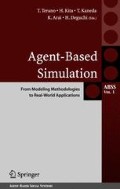Summary
Conventional supply chain management (SCM) is not always concerned with optimal solutions in terms of product allocation. Virtual market based supply chain operation solves the product allocation problem by distributing the scheduled resources according to the market prices, which define common scale of value across the various products. We formulate supply chain model as a discrete resource allocation problem, and demonstrate the applicability of the Walrasian virtual market concept with multi-agent paradigm to this framework. In this paper we demonstrate the proposed algorithm successfully calculates Pareto optimal solutions in the supply chain product allocation problem by comparing our method with conventional analytic approaches, such as ε constraint method and fixed point algorithm.
Access this chapter
Tax calculation will be finalised at checkout
Purchases are for personal use only
Preview
Unable to display preview. Download preview PDF.
References
Wellman M. P., A Market-Oriented Programming Environment and its Application to Distributed Multi-commodity Flow Problems, ICMAS-96, 1996, pp385–392.
Kaihara T., Supply Chain Management with Market Economics, International Journal of Production Economics, Elsevier Science, Vol. 73, Issue 1, 2001, pp.5–14.
Shoven J. B. and Whalley J., Applying General Equilibrium, Cambridge University Press, 1992.
Scarf, H. E., The computing of Economics Equilibria, New Heaven, Yale University Press, 1973.
Brouwer, L.E.J., Collected Works 1. Philosophy and Foundations of Mathematics, A. Heyting (ed.), North-Holland, 1975.
Author information
Authors and Affiliations
Editor information
Editors and Affiliations
Rights and permissions
Copyright information
© 2005 Springer-Verlag Tokyo
About this paper
Cite this paper
Kaihara, T., Fujii, S. (2005). A Study on Pareto Optimality of Walrasian Virtual Market. In: Terano, T., Kita, H., Kaneda, T., Arai, K., Deguchi, H. (eds) Agent-Based Simulation: From Modeling Methodologies to Real-World Applications. Agent-Based Social Systems, vol 1. Springer, Tokyo. https://doi.org/10.1007/4-431-26925-8_18
Download citation
DOI: https://doi.org/10.1007/4-431-26925-8_18
Publisher Name: Springer, Tokyo
Print ISBN: 978-4-431-26592-4
Online ISBN: 978-4-431-26925-0
eBook Packages: Business and EconomicsEconomics and Finance (R0)

